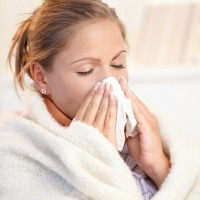Lack of Sleep Raises Cold Risk

Numerous studies suggest the health promoting effects of a good night’s sleep. Aric Prather, from the University of California/San Francisco (UCSF; California, USA), and colleagues enrolled 164 healthy men and women, ages 18 to 55 years, in a study in which subjects were assessed for sleep duration and sleep continuity for 7 consecutive days. A watch-like sensor was utilized to measure the duration and quality of their sleep. Afterwards, participants were quarantined and exposed to the common cold virus (rhinovirus), and monitored for 7 days. Daily mucus samples were collected, to determine if the virus had taken hold.
Data analysis revealed that shorter sleep duration associated with an increased likelihood of developing a cold. Subjects who sleep 6 hours a night or less were 4-times more likely to catch a cold, as compared to those who slept 7 hours. The study authors write that: “Sleep goes beyond all the other factors that were measured,” Prather said. “It didn’t matter how old people were, their stress levels, their race, education or income. It didn’t matter if they were a smoker. With all those things taken into account, statistically sleep still carried the day and was an overwhelmingly strong predictor for susceptibility to the cold virus.”